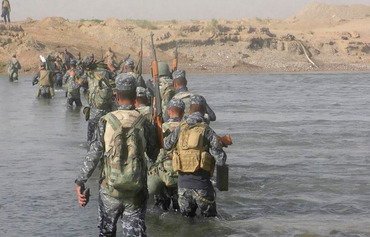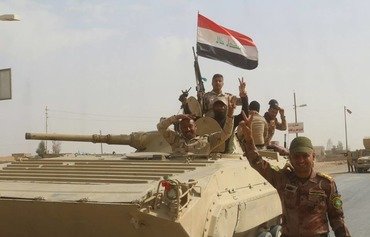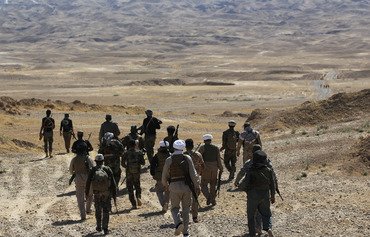Iraqi forces ramped up their deployment in the city of al-Hawija in the wake of an ambush by "Islamic State of Iraq and Syria" (ISIS) elements that killed 27 fighters of a paramilitary group allied with Iraqi forces on Sunday (February 18th).
The troops are now conducting large combing campaigns in search of the perpetrators and tracking down their cells and secret bases around the city.
The ambush occurred as the fighters were trying to clear the village of al-Saadaniya in al-Hawija’s al-Riyadh district of ISIS militants.
ISIS, which has suffered a string of battlefield defeats in Syria and Iraq, claimed responsibility for the attack in an online statement.
An Iraqi official who asked to remain anonymous told AFP the extremists, disguised as soldiers, had set up a checkpoint close to al-Hawija.
They asked the Iraqi fighters to stop, get out of their vehicles and stand beside the road, on the pretext of conducting a search.
They then shot the fighters and fled, the official said.
Reinforcements arrived too late to stop the attack.
A senior police officer in the province, who also asked not to be named, said most of the bodies had been beheaded.
Need for 'a massive military campaign'
After the al-Hawija liberation campaign concluded in October 2017, ISIS sleeper cells still remained in the city, said al-Hawija governor Sabhan al-Jubury.
Most of the ISIS elements "had withdrawn from their positions to remote areas without putting up a fight", he told Diyaruna.
They hid in "burrows that they could later turn into launchpads for their attacks against Iraqi forces and civilians", he said.
"Our areas are still not completely purged [of ISIS]," al-Jubury said, noting that ISIS sleeper cells are exploiting areas of weak security deployment in remote villages to carry out cowardly crimes.
Inspections and security reinforcement are not enough to terminate the threat, he added.
"We need a massive military campaign in which security forces thoroughly clear every inch of al-Hawija's outskirts, especially in the string of hills to the south of the city," he said.
Al-Jubury also called for continuing the combing operations in al-Riyadh, al-Rashad and al-Abbasi, and in the Hamreen Hills area, which "continues to pose a major threat to many cities".
There is a need for co-operation between all units and for deploying a large number of Iraqi troops before carrying out any attack or security operation against ISIS remnants, he added.
The Sunday ambush has sparked angry reactions among the Iraqi public and Iraqi officials.
Prime Minister Haider al-Abbadi on Monday issued orders to hunt down the perpetrators, stressing the government's determination to terminate "sleeper cells and terrorist pockets".

![The bodies of victims of an 'Islamic State of Syria and Iraq' ambush in al-Hawija on Sunday (February 18th) were flown to their families. [Photo courtesy of Iraqi MP Fawzi Akram Tarazi]](/cnmi_di/images/2018/02/20/11549-Iraq-victims-ISIS-600_384.jpg)







Again, don't write the Islamic State unless you admit that it's an Islamic state. Rather, write ISIS and a terrorist organisation.
Reply1 Comment(s)